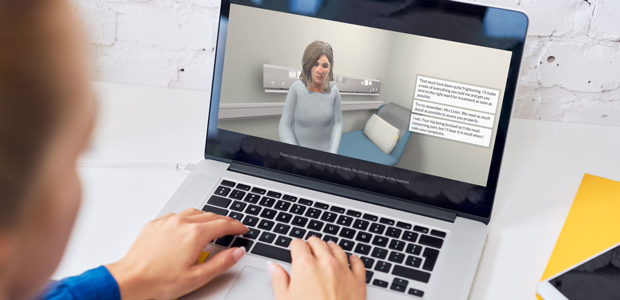
Game-based training in healthcare: a matter of life and death
In healthcare, the consequences of human error can be fatal. With NHS resources already strained, hospitals require training programmes that deliver for both staff and – crucially – patients.
Like many Trusts across the NHS, Liverpool University Hospital Foundation Trust (LUHFT) is still faced with a dilemma that began during the pandemic: how to effectively train its administration and frontline staff in a hybrid workplace. While hybrid work offers flexibility for frontline staff, it also creates challenges in rolling out training to almost 4,000 staff members.
LUFHT’s latest training programme aimed to create effective IT system training that not only encouraged interaction but could also be delivered remotely via mobile and desktop devices. Plus, the training had to be relevant to all key stakeholders, including nurses, doctors, healthcare assistants and administration staff.
A routine operation
Before the pandemic, system training for the Trust required almost 4,000 staff members to take a day away from the frontline over the course of a few months.
However, due to the increased strain that COVID-19 placed on physical and human resources for hospitals across the UK, removing staff from their posts to conduct face-to-face training sessions is no longer an option.
The new training, which can be completed in a matter of hours, overcomes these challenges. To adhere to staff members busy schedules, the training can be carried out remotely via a mobile device, meaning staff can stay focused on their primary concern – patients.
The other key factors in the success and growth of game-based simulation training are scalability and cost-effectiveness.
The remedy
Through LUFHT’s invaluable insight and Attensi’s unique blend of human psychology and gaming mechanics, we created a programme to train staff on the PaperLite systems, an established training app that unifies systems across the Trust by providing a single patient record for all patients across multiple sites.
This app allows users to complete training in a computer game-style setting, including earning points on completion, discovering new insights, unlocking bonuses, collecting awards, and beating colleagues on a leader board. It’s these features that encourage both learning and social interaction. The app’s bite-sized, virtual scenarios allow employees to not only engage anywhere, anytime but also make mistakes in a safe to fail environment.
Within this app, Attensi created ‘Eleanor’, a virtual patient who exhibits all of the complexities of a real-life patient. Users are tasked with interacting with Eleanor before using the IT system, replicating what they would do in real-life staff-patient interaction.
The app can also be adapted and updated as the needs of the healthcare industry change. Offering this level of customisation empowers the Trust to future-proof its business and provide ongoing support for its employees.
Since implementing Attensi’s training, LUFHT has witnessed measurable and sustained success, including an increase in staff confidence and knowledge across the entire organisation. In terms of compliance, the Trust has access to accurate data on which staff have completed the training. This means senior leaders can be confident that team members are competent in using frontline systems.
The future of medicine
As a result of the training’s initial success within the NHS, there has been a high volume of sign up and interest from other Trusts which are now looking to be innovators within the healthcare sector.
We are currently rolling out a range of initiatives, including finance and fraud training and conflict resolution training. The conflict resolution training will focus on employee’s soft skills, which are vital to ensuring dignity and respect – key principles of the Care Quality Commission (CQC), the independent regulator of health and social care in England.
Lastly, a programme that was delivered in Norway that we would like to bring to the UK is orientation training. This programme allows us to digitally create a brand-new hospital months in advance, allowing employees to understand the logistical layout of their new surroundings, the technology present within the hospital and how it is used. As it is not always feasible to offer this opportunity in person, this makes it much easier for employees to settle into their new environment and hit the ground running.
Although we have already achieved a lot together, we believe we can further empower the NHS to continue to deliver for both its staff and users across the country.

